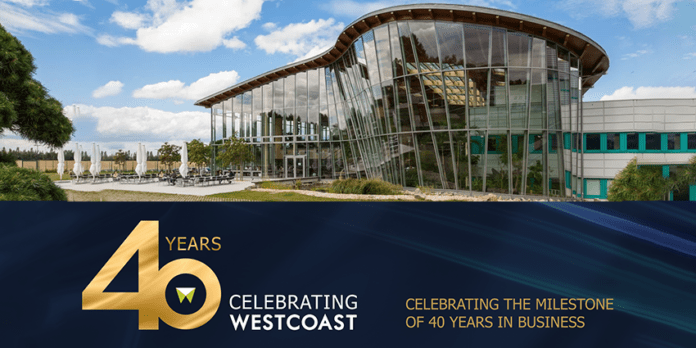
Alex Tatham has recently returned to Westcoast after a year away in a new and expanded role and is focused on making the company thrive and take advantage of the opportunities presented by its recent deal with Komsa and in the channel in general.
Alex Tatham is in fine form. Back at Westcoast after a year away, he is relaxed, happy and enthused about his new role and the prospects for the company. You sense he has come back home – and is ready to help take the business to new heights.
He had previously spent 15 years at Westcoast, including in the roles of sales and marketing director of the wholesale business and latterly as managing director of the UK business. “When I joined the business, it was about £600 million turnover, and when I left it was £3.6 billion – a fair bit of growth and most of that was organic,” he says.
Alex left to join one of Westcoast’s customers, NSC Global Services, where he experienced a different role to what he had been used to. “It was incredibly different from selling hardware and consumables mostly in the UK to selling services for a global business,” he says. “But what a learning experience it was, and I am happy to have done so because learning about services and how people do services has been important and I will be able to bring that experience to what I am doing now.”
He had been happy at NSC Global Services, but when Westcoast’s founder and chairman Joe Hemani called Alex with an offer of a new role that goes across the group, it was too tempting to turn down. “I said I’d be delighted to return, and I am delighted to be back,” he says. “Joe’s only instruction to me was, ‘Alex, do what you do’, which shows me that he trusts me to go and help with new and existing customers and help our people. Account managers change and they say, ‘Alex, can you help me with this? I’ve just inherited this account. Who do you know there?’ I’m using my network a lot at this point.”
Komsa
Alex will also be getting involved with Westcoast’s German partner Komsa and ensuring that Westcoast customers can take advantage of their products going forward. The merger of the businesses was announced in October 2022.
“Komsa is a very different business to Westcoast,” says Alex. “They have a significant mobile business, as well as voice and unified comms. That’s something Westcoast will be taking advantage of going forward as a new part of our business.”
Alex adds that while the convergence of communications has been talked about for many years, it is only now, post-Pandemic, that it is starting to happen. “Most people can do most of their telephony using their IT devices, but with a call plan attached to it,” he says. “Westcoast, along with many others, threw their PBX system in the bin; no one has a desk phone anymore at Westcoast.
“Then we’ve got the PSTN switch off coming in September 2025 and stop-sell later this year. There are 200 million lines in our country alone, and it will happen in France and Germany as well. The world is switching off, so there’s a big job to do to convert everyone. Convergence is gathering pace and that’s going to transform a lot of the voice reselling market as you can’t just sell PBX systems anymore. I think you’re going to see them absorbed by IT companies and IoT resellers and they’ll all set up voice practises within them.
“Voice is a huge area and there’s so many things that are going to stretch together. But perhaps most importantly for Westcoast is that Komsa is a large HP/Poly distributor and we’re looking forward to being able to distribute HP/Poly products later this year.”
Alex adds there are no plans to fully merge Komsa into Westcoast. “Komsa is a different business to Westcoast, particularly in Germany, although they have a subsidiary in Poland, which is more like Westcoast in terms of what they do,” he says. “Our job is to make sure that we help each other; we already do some business in Germany in print and consumables, and you can see that comms is going to be big so they will be helping Westcoast with its UC strategy.”
More opportunities
Westcoast is also focusing on its core competency as a retail distribution business, and Alex will be involved in this too. “We are selected by a lot of retailers to do their fulfilment for them and a lot of vendors the other way around,” he says. “I’m certain that there will be more retail opportunities coming through particularly as we expand into other parts, particularly telephony.”
Another part of the Westcoast business that is growing quickly is cloud. “Our cloud business is doing well; its a £150 million business so far and is growing like crazy, largely with Microsoft but with all software. Whether it’s subscription licencing or consumption-based licencing – i.e. how much have you used per head as opposed to an annual subscription – both types will be sold via Westcoast Cloud and that will include cybersecurity.”
Market trends
Alex’s optimism about Westcoast is indicative of his positivity about the channel in general. After the tough times of COVID, along with supply chain issues and rising costs, there is now a feeling that the market is set for growth for the foreseeable future.
“Now people are coming back to the offices, there is a hybrid environment and that’s how people are going to work in the future,” he says. “There’s still probably less printing going on than there was pre-COVID, but I think that has stabilised. And now we’re looking for efficiencies and how do we do this better.
“We’re moving the office and print environment forward and things are getting better because people are beginning to see where the land lies in this country.”
Agility
Westcoast is well placed to capitalise on this, especially due to its agility – something that other comparably sized businesses often do not have.
“It’s one of the things that I think makes our business different to the others,” says Alex. “At Westcoast we can bend ourselves into the shape that customers or vendors require us to and take advantage of the fast-paced change that is going on. One of the reasons that Westcoast has been successful over the 40 years it has been in business is because of its agility.”
Another reason is that the business is still independently owned, and managers are given space by the board to manage their employees. “The way that I’ve always asked our managers to manage is manage underneath their people. I e. How can we help them to hit their targets? How can we help them do their job as opposed to beat them up until they do? I want to try and engender a place where people have got plenty of room in which to do their job and to breathe and to be entrepreneurial within that and have a go, but also feel as though they can ask for help and the managers help them when they do. That, again, feels like a different type of business to many of our competitors.”
Partner of the Year
There is also an appreciation of the value of service provided, not just the quality of the products. Indeed, Westcoast recently won Microsoft Partner of the Year for Devices in the Distributor/Reseller category. “That was amazing to win a global award like that,” says Alex. “We were up against these global entities. It shows what Westcoast does so well and that we’re a business that counts on the world stage now. We bend ourselves into the shape that our vendors want us to bend into, but also allows the vendor to work with us to be able to develop a programme that they can then roll out across the world because we’re big enough to do that.
“For instance, we do Device as a Service, and we help Microsoft compete in different markets in many ways. That is one of the reasons that we won device distributor the year; we don’t just sell lots of PCs, but help Microsoft with a global view. Vendors particularly like that about Westcoast and that again comes from its agility. The future is Device as a Service. If you get a multinational end user, they’re looking for all these devices to be managed: they need to know where they are, what software that is on them and who’s using them all the time.
“End users also need to ensure the devices are current and they haven’t overspent on a bunch of obsolete machines – and that happens a lot. Retailers are increasingly looking for the range of post-sale services so they can offer a full device as a service proposition and if you could do it for PCs, then you could do it for other things as well.
“We’ll be looking particularly at PCs because we’re so good at it, but also networking where we have a strong footprint. We are Aruba’s partner of the year, for instance. And as WiFi 6 gets rolled out, you need to do site surveys and make sure that you add value by being able to manage the rollout and deployment of new WiFi capability and then manage and maintain it going forward. Those things previously done by system integrators are now being done by resellers and our job is to empower smaller resellers to be able to do this by offering that as a white box service that they can brand themselves.
“As we sell almost 50% of the UK’s laptops and PC devices, it’s incumbent upon us to make sure that our service proposition is strong not just pre-sale, but also post-sale. That’s something I’ll be working on going forward.”
Future
Alex is firmly focused on the future of Westcoast and ensuing the business continues its impressive recent growth and capitalises on the opportunities in the industry and those presented by its partnership with Komsa.
“Things are changing – we have artificial intelligence (AI) becoming more popular, for instance,” he says. “What’s going to be the impact of AI? A lot of people are already looking at various elements of this. But what they are going to need is bigger computers, with more computing power at the edge because there’s going to be so much more data created by this that will need to be processed.
“It will also change all our jobs. And while that can be scary, from a computing and IT perspective there are lots of opportunities to do exciting things with this. I think the IT industry is in a great position to take advantage of AI and to extol its virtues, as well as help protect the world from its dangers.
“That’s clearly a direction that the whole industry will take and inevitably that will have an impact on Westcoast and what we do. Exactly how that looks and feels, it’s a bit early to say, but that’s going to happen. As I said, it pays to be agile and flexible because that will allow us to be able to take advantage in this area.”
Related posts:
- Exertis Partners with CT4 to bring Microsoft 365 Backup Services to UK market
- Lenovo Showcases How Smarter Technology is Empowering a Changing World at Tech World ‘22
- Resellers as Guardians: Tackling Escalating Security Threats in Network Infrastructures
- Addressing data centre challenges in the era of surging AI workloads












